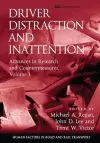
Driver Distraction and Inattention
John D Lee - Hardback
£160.00
Deborah A. Boehm-Davis, PhD, is professor of psychology and dean of the College of Humanities and Social Sciences at George Mason University, USA. She received her master's and doctoral degrees in cognitive psychology (1977 and 1980, respectively) from the University of California, Berkeley, USA, and her bachelor's degree in 1975 from Douglass College of Rutgers University, USA. Prior to joining George Mason University, USA in 1984, she performed applied cognitive research at General Electric, the National Aeronautics and Space Administration (NASA) Ames Research Center, and Bell Laboratories. More recently, she served as a Senior Policy Advisor for Human Factors at the U.S. Food and Drug Administration's Center for Devices and Radiological Health. Dr. Boehm-Davis also has served as President (1993–1994) and Secretary-Treasurer (1990–1991) of the Human Factors and Ergonomics Society (HFES) and as President of APA Division 21 (Applied Experimental and Engineering Psychology; 2004–2005). In addition to coauthoring An Introduction to Humans in Engineered Systems (2012), she has been an associate editor for Human Factors (2006–2013) and the International Journal of Human–Computer Studies (1986–2012) and has served on the editorial boards of several other journals. She is a fellow of the HFES, APA, and the International Ergonomics Association. Dr. Boehm-Davis received the Franklin V. Taylor Award for Career Contributions from APA in 2003 and the Award for Scientific Achievement in the Behavioral and Social Sciences from the Washington Academy of Sciences in 1994, USA. Additionally, she has testified before the U.S. Congress and served on numerous panels for the National Research Council, the National Research Foundation, the Transportation Research Board, and NASA. She was a member and chair of the Federal Aviation Administration's Research, Engineering, and Development Advisory Committee as well as a member of its Human Factors Subcommittee. She was also a member of the Air Force Scientific Advisory Board and the Transportation Security Administration's Scientific Advisory Board. She currently serves on the board of the annual ""Fall for the Book"" festival and is a member of the George Mason University Foundation's Board of Trustees.
Francis T. Durso, PhD, is professor of psychology in the Engineering Psychology Program at the Georgia Institute of Technology in Atlanta, USA. He received his doctoral degree in cognitive psychology from the State University of New York at Stony Brook in 1980 and his bachelor's degree in psychology from Carnegie Mellon University, USA in 1975. A member of the National Research Council's Board of Human Systems Integration, Dr. Durso has been President of the Human Factors and Ergonomics Society (HFES; 2014), President of the Southwestern Psychological Association (1990), and President of APA Division 21 (Applied Experimental and Engineering Psychology; 2007–2008). He was a founding director of the University of Oklahoma's Human–Technology Interaction Center and a cofounder of the Oklahoma Psychological Society. Additionally, he has served as advisor and panelist for the Transportation Research Board, the National Science Foundation, APA, and the Government Accountability Office. A current member of the editorial boards for several journals, including Human Factors, Dr. Durso also was an associate editor of the Journal of Experimental Psychology: Applied (2007–2012) and a senior editor of the Handbook of Applied Cognition (1999; 2nd ed., 2007). He is founding editor of the forthcoming monograph series from HFES on human factors methodology, and he also coauthored Stories of Modern Technology Failures and Cognitive Engineering Successes (2007). He is a fellow of the HFES, APA, the Association for Psychological Science, and the Psychonomic Society. In 2011, he received the Franklin V. Taylor Award for Outstanding Achievements in Applied Experimental and Engineering Psychology from APA. In most of his applied work, Dr. Durso explores cognition in dynamic environments, particularly transportation (with an emphasis on air traffic control) and health care. He is a codeveloper of the Pathfinder scaling algorithm and the Situation Present Assessment Method (SPAM) for evaluating situation awareness. His current research focuses on cognitive factors underlying strategy selection and discovery, especially as related to providers and consumers of health care.
John D. Lee, PhD, is Emerson Electric Professor in the Department of Industrial and Systems Engineering at the University of Wisconsin, Madison, USA, and Director of the Cognitive Systems Laboratory. Previously, he was a professor at the University of Iowa, USA and the Director of Human Factors Research at the National Advanced Driving Simulator. He received his master's and doctoral degrees in mechanical engineering (1989 and 1992, respectively) from the University of Illinois, USA at Urbana–Champaign and bachelor's degrees in mechanical engineering and psychology from Lehigh University, USA (1988 and 1987, respectively). Dr. Lee's research focuses on the safety and acceptance of complex human–machine systems by considering how technology mediates attention. Specific areas of research expertise include simulator-based investigation and model-based analysis of driver assistance systems and driver distraction. This research has been sponsored by a variety of governmental agencies, including the National Highway Traffic Safety Administration and the Federal Highway Administration, as well as by automotive companies such as General Motors, Honda, and Nissan. Dr. Lee is coauthor of An Introduction to Human Factors Engineering (2nd ed., 2003) and the author or coauthor of more than 170 articles. He recently helped edit The Oxford Handbook of Cognitive Engineering (2013); the Handbook of Driving Simulation for Engineering, Medicine, and Psychology (2011); and two books on distraction — Driver Distraction: Theory, Effects, and Mitigation (2009) and Driver Distraction and Inattention (2013). He has served on several National Academy of Sciences committees, including the Committee on Human Systems Integration.